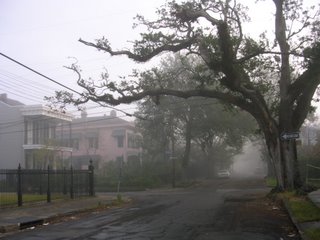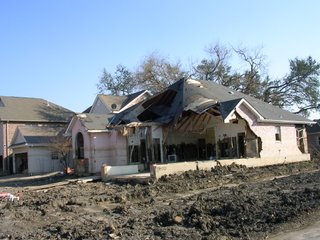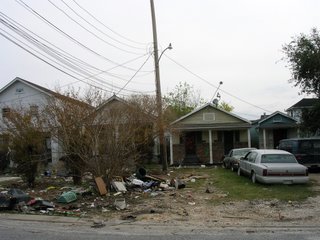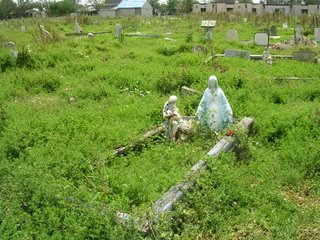losing New Orleans

Last October, as my husband and I drove over the high rise into St. Bernard Parish to check on Chalmette, I looked out of the passenger window and saw a distant New Orleans, supernal as an early risen moon, a mirage at the end of a long checkered spread of dark water and quivering marshland, some of it already greening. For the first time I saw how dangerously New Orleans rests, literally and figuratively, at the very edge of our America, too close to the dissolve and I felt true panic slide and settle at my center. We had less than a year to the next hurricane season; less than a year to rigorously impassion an indifferent nation to fight for the life of a city whose existence, until Katrina, had always depended upon miracle itself.
It is now nearly May.
The city is still a necropolis. Everywhere we are reminded of death: by the persistent resin gristle and down of bird parts still pasted to the ground, casualties of the force of Katrina’s winds; by the continual appearance of fresh dog corpses, barrel-bellied and stiff, lying on their sides, paws crossed, necks swollen around dirty collars; by the constant sirens of fire engines, yet another house somewhere burning. Even in my neighborhood, which was mostly spared flood, piles of heavy storm debris still sit unclaimed, growing pulpy in the humidity and winter/spring rains. Regular garbage pick up is sporadic, sometimes once weekly, sometimes not even that, and the bags reek so badly that dogs swing clear of them.
When I bought my Uptown house 11 years ago, I planted a traditional olive tree beside the front porch, and confederate jasmine on either side of the stairs. Here, in the black delta dirt, as moistly clotted and clinging as chocolate cake, gardens explode. My jasmine crept to the top rails of the porch and then cascaded down, like a diva's hair, nearly eight feet to the ground. The bergamot scent of the olive tree in autumn and the swooning, buttery effusion of the jasmine in spring enthralled me. I knew that the tradition of planting fragrant flora was once a necessity--more than a century ago New Orleans had its slaughterhouses just six blocks down from my street, at the river. I never imagined that I would welcome my garden for the same reason. Katrina's floodwaters stopped a mere two blocks from my house. Contrary to the media, the flood covered and sat on the entire city like a lung. It did not discriminate economy or class. Those with dry homes (whose roofs held) accomplished this by simple luck and I was among the lucky. But the stench still creeps into the air, miasmic. It is sometimes so strong, breathing makes us feel as if we are eating it. It is the stink of the slaughterhouse and the latrine, and with it an aftertaste, an acidic, chemical smear. Katrina has returned the city to the 19th century, when people tossed their chamber pots and other visceral deritus right onto the street.
As an expatriate New Yorker with a brother in-law in the FDNY, 9/11 was one of the worst events in my life. Katrina is worse yet. The general lack of sympathy for the city, especially after the way the nation rallied around New York post 9/11, stuns me. We lost 1200 people to Katrina and no one cares. There is little assistance down here in New Orleans; promises of money to kept the city solvent for a year and money to keep our hospitals running were never forthcoming. The great exodus of our population took with it the culture of New Orleans, a culture not seen anywhere else in the nation. This consequence of Katrina is even more traumatic than the structural demise of the city. 
A greater porportion of homeowners in New Orleans held flood insurance at the time of Katrina than other cities in comprable locations. Flood insurance is extremely pricey in New Orleans--I have held it for 10 years without need of it, as is true for most New Orleanians. Other states, like Florida, have suffered repeated hurricane strikes, so why is it that the nation feels New Orleans should be abandoned and not Florida? I have lived in Florida, left a lovely little house a block from the water in order to return to New Orleans. New Orleans is a siren and she calls. Would that the nation could experience this, the real New Orleans, repository of all national victories and all national sorrows. Our story, our history is a thumbnail of American history, of America's becoming. But ours is not a white washed, polished history. We carry within us all the brutal truths of America's success: slavery; the exploitation of immigrant labor; life folding too easily inward towards death. Perhaps that is why the nation wants to bury us. Americans these days do not seem to want to be reminded of what cost comes greatness.
copyright@2006 Angelica Kiedrowski (portions of this blog have been previously published)






0 Comments:
Post a Comment
<< Home